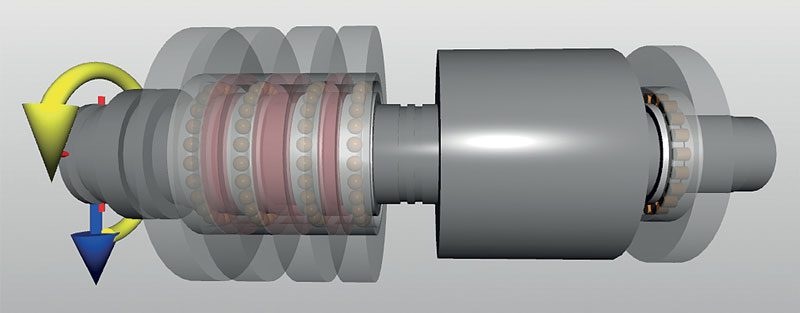Spindle Bearing Advanced Simulation Tool
The bearing arrangements of machine tool spindles very much determine the performance of the spindle. SKF has developed a brand new simulation tool, SimPro Spindle, in order to enablee spindle designers to quickly identify the optimum bearing configuration for the planned application. The tool acts as a “virtual test bench”, providing valuable information about the dynamic forces to which the bearings in spindles are exposed.
by Giorgia Stella
SimPro Spindle is the new spindle bearing simulation program developed by SKF and based on the company’s powerful SimPro calculation software. This tool contains SKF’s combined engineering knowledge of the complex interactions of bearings and lubrication systems. It works like a “virtual test bench”, providing valuable information about the dynamic forces to which the bearings in spindles are exposed. With its help, users can quickly and precisely test the optimum design of bearings for the respective application requirements or conditions.
A “direct connection” to the rolling bearing portfolio
For this purpose, SKF SimPro Spindle is first fed with data on all relevant components such as shafts, bearings, gears, lubricants, spacers and springs. An intuitively operable input mask is available for this, including a “direct connection” to SKF’s permanently updated rolling bearing portfolio.
The user now adds operating conditions such as speeds, temperatures, loads and lubrication as well as fits of shaft and housing to the resulting model. The load and speed conditions can also be entered as a combined load cycle. Partial or full load analyses can then be carried out, depending on the operating conditions of the machine.
Easily calculating variables and performance parameters
Following the virtual test run, SKF SimPro Spindle provides its user with a variety of useful performance parameters such as bearing service life and load, load zones, contact stresses, bearing misalignment and kinematics, lubricant characteristics, bending lines or system frequencies. The eigenmodes of vibration can be depicted in the form of 3D animations. In addition, the tool can calculate the required tightening torques, calculate the grease service life and help optimize the oil flow rates including the position of the oil nozzles. It also has improved preload and bearing clearance calculation for entire groups of high-precision bearings within a spindle. Because the simulator takes into account the interaction of the most diverse interacting variables, it can significantly shorten the development times of new designs. And in order to be able to use this speed advantage right from the start, beginners to the program can get first instructions from an SKF application engineer. This helps with an initial evaluation of the optimum spindle bearing configuration.

